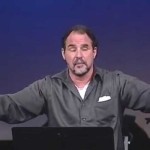We run our website the way we wished the whole internet worked: we provide high quality original content with no ads. We are funded solely by your direct support. Please consider supporting this project.

How can prayer change God’s mind?
Every week we get in all kinds of questions and comments from our readers. If you have a question, first check our ever-growing Q&A page, and then send it to us if it hasn’t already been answered. We can’t get to them all, but yours might be answered and featured like this one below.
READER: You’ve argued that since God is all-good, he’s always doing the most he can do in every situation to bring about good. But you have also argued that prayer can change God’s mind. How are these two beliefs compatible?
GREG: The beliefs aren’t incompatible if you believe, as I do, that God wants humans to have significant “say-so” in affecting what comes to pass. As such he created a world in which we have “say-so” on a physical level, making decisions that affect what comes to pass through our physical activity. We also have “say-so” on a spiritual level, affecting what comes to pass through prayer. By God’s own sovereign will, he bound himself to be affected by whether or not humans engage with him in prayer.
Hence, there are things that God would like to happen that won’t happen unless his people pray. In Scripture, there are times God plans on going in one direction, but hopes that his people will intercede to change that direction. For example, he told Ezekiel he planned on bringing judgment on Israel but tried to find someone to “stand in the gap on behalf of the land so [he] would not have to destroy it.” Unfortunately, he says, “I found no one” (Ezek. 22:30). Many other times, however, God allows his plans to change in response to his people talking to him (e.g. Ex. 32:14). I imagine it like a reservoir of divine power that won’t – can’t—be released unless his people agree with him about releasing it, or like a trust fund that requires a co-signer to be released. What God’s people do and don’t do really matters.
Image by OpenSource.com. Used in accordance with Creative Commons. Sourced via Flickr.
Category: Q&A
Tags: Christian Life, God, Open Theism, Prayer, Theology
Topics: Apologetics, Open Theism
Related Reading

Single and an Open Theist—Help! (podcast)
Greg, Dan, and Barbara talk about looking for love in a chaotic world. Episode 515 http://traffic.libsyn.com/askgregboyd/Episode_0515.mp3

Bowing to the American Flag. Literally.
Kurt Willems shared this interesting item he found on Amazon. In the product description it admonishes us to: Submit yourself to the Prayer Bench and open up your life to receive more of God. Hmmmmmm. How about we just submit ourselves to God?

When Did You Let Go of Your Calvinist Beliefs? (Podcast)
Greg talks about his unusual transformation out of Calvinism. Episode 471 The Interview: http://traffic.libsyn.com/askgregboyd/Episode_0471.mp3 Photo by Paola Franco on Unsplash.com

God’s Heart to Prevent Judgment
In Ezekiel we read a passage that depicts Yahweh as warning his people about their impending punishment by saying, “I will pour out my wrath on you and breathe out my fiery anger against you” (Ezek 21:31a). As we find in several other texts, Yahweh is here depicted as a ferocious fire-breathing dragon—a portrait that…

The Case for Including Open Theism Within Arminianism
Here is an excellent post by my good friend Roger Olson in which he makes the case that Open Theism should be embraced by Arminians as an orthodox, if somewhat non-traditional, form of their faith. In fact, Roger argues (rightly in my opinion) that Open Theism is much closer to the “heart” of Arminianism than…

Sermons: Hanging in the Balance
Prayer is a fancy word for talking to God. In this short sermon clip. Greg Boyd introduces what prayer is designed for and what it can be used for. The Bible shows us that our prayers make a difference in this world. Yet, our picture of God doesn’t always line up with that truth.…
